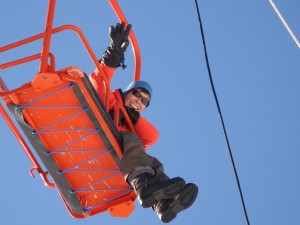 Why is this woman on a chairlift with no skiis or snowboard?
Why is this woman on a chairlift with no skiis or snowboard?
Meet Karen, my fellow volunteer Canadian Ski Patroller at Manning Park, BC. Every year, no matter how experienced we are, all patrollers and mountain staff practice the dreaded “lift evacuation”. We hope we never have to do a real lift evacuation, but if the worst case scenario happens, we’re ready!
Rick Mercer tries out for the Canadian Ski Patrol:
I’ve been “Shushed” a lot lately. I’ll joke about the worst thing that could happen, and I hear “Don’t put that out to the universe!” or “Quick! Take that back! Only say positive things!” Laughing, I turn to look at these well-meaning friends and peers … they are serious.
So-called “gurus” have people believing that saying what might go wrong will “manifest” it into existence. I started wondering … “Did I cause someone to rear-end my jeep at a red light because I wasn’t focused on positive thoughts?” “Have I caused the horrible housing market I had to sell my townhome in?” … and then I gave my head a shake.
Life happens. All we can do is weigh the situation, work to minimize our risks and try to maximize our rewards. When there’s 9 ways something can end up well and 437 ways it could go wrong, chances are good that something will go wrong. If we focus only on the ways it could go right, we are completely unprepared to handle problems, no matter how minor. People over-react, flap about and point fingers. As usual.

At work, have you watched people run around like chickens with no heads, busily and urgently flapping hands and pointing fingers when problems crop up? A workday rarely goes perfectly, unless you deal with no people and no change … even then, so much could go sideways. It’s easy to get upset. “Why can’t everything just go right for a change?” “If it’s not one thing going wrong it’s another.” We grumble, as we watch our deadlines get pushed, our schedule turn inside out and our peers either flap about, point fingers or duck and cover.
What if your team brainstormed each week on all the things that could go wrong with a project? What if you articulated the risks completely and then made an action plan to work around potential speedbumps, hiccups and brick walls before they happened?
If the ski patro l focused all their energy on willing everyone to have an injury-free day and did not expect any accidents to happen, we wouldn’t notice potential hazards to fix. We wouldn’t practice our skills or check equipment. We wouldn’t be prepared to come to each others’ aid when a call came in. Bad things would happen. Luckily for our patients, we re-train before and during every season. We are prepared for ANYTHING. This keeps us calm, efficient and effective, which helps everyone else stay calm when accidents happen.
l focused all their energy on willing everyone to have an injury-free day and did not expect any accidents to happen, we wouldn’t notice potential hazards to fix. We wouldn’t practice our skills or check equipment. We wouldn’t be prepared to come to each others’ aid when a call came in. Bad things would happen. Luckily for our patients, we re-train before and during every season. We are prepared for ANYTHING. This keeps us calm, efficient and effective, which helps everyone else stay calm when accidents happen.
The next time you are in a meeting discussing a project, I challenge you to talk about the elephant in the room. Be brave and, in the face of all “the Secret” fans, dare to say “What could go wrong during this project, and how will we deal with that?”
You might be unpopular for about 30 seconds. The meeting chair or project champion may even say “We’ll deal with that at the time, if anything does go wrong. Just focus on making everything go right.” and we all know what happens later. Stick to your guns and say “Of course we’re going to work hard to make all things go right, but what risks are out of our control and how can we jump into action to create the greatest outcome, even if the worst case scenario does happen?”
As your team comes together to plot alternate plans, each member will gain confidence, knowing the team is prepared for the worst. Heads won’t roll. You’ll simply activate plan B. Now they can focus on achieving the best possible results, without fear of the unknown.
Comments? Post them below. I’d love to hear from you!

[…] Why is this woman on a chairlift with no skiis or snowboard? Meet Karen, my fellow volunteer Canadian Ski Patroller at Manning Park, BC. […]